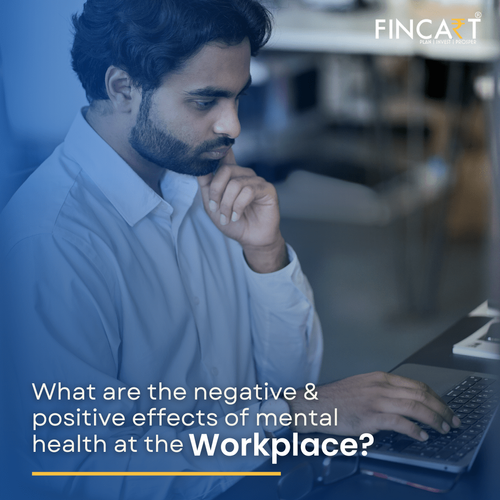Table of Contents
Toggle“Almost everything will work again if you unplug it for a few minutes, including your mind” – Anne Lamott
In our previous blog, we talked about the role of mental health & why it is important.
Everyone is dealing with some or other personal problems & work-related risks just amplify one’s mental health.
Since we spend most of our day at work, mental health is critical for respecting ourselves and others, building positive relationships with coworkers, and coping with the challenges and responsibilities of their jobs each day.
There is no doubt to say this, that work-related risk factors play a negative role in an employee’s mental health. Creating an atmosphere where you can talk to someone about your problems at your workplace should be an acceptable option.
Well, in this blog, let’s see the positive as well as negative impacts mental health can have at your workplace!
Negative effects of poor mental health in the workplace:
1. Lack of engagement with one’s work:
Have you ever felt demotivated to do any task? Or do you have Poor mental health that leads to demotivation and lack of focus? When we have workplace mental health issues, our minds wander or fixate on our problems, making it difficult to regulate our thoughts and emotions.
2. Productivity and job performance suffer:
High performance is mental strength in motion. Poor mental health can reduce job performance since it makes accessing the behavioral skills that foster creativity and resilience all the more challenging. Without these skills, we don’t have the psychological resources to perform well at our jobs.
3. Reduced physical capability and daily functioning:
From social anxiety to a reduction in cognitive performance and working memory, poor mental health takes a major toll on your daily living and physical capability.
4. Misaligned communication
It’s difficult to communicate well when we’re emotionally not feeling well. Poor mental health may lead to misinterpreting or overreacting to colleagues. It may come across as speaking with a passive-aggressive tone, being a poor listener, or having a negative attitude.
5. Poor decision-making
Poor mental health can lead to a lack of impulse control, unhealthy thoughts, and poor decision-making. Poor decision-making may lead to missed meetings, showing up late, dropping commitments, or not adhering to company policies.
Also Read: What Factors Impact Mental Health in The Workplace?
Positive effects of mental health in the workplace:
Positive mental health can have a significant impact on a person’s job performance and overall well-being in the workplace. Here are some ways in which positive mental health can positively influence one’s job:
1. Increased Productivity:
When employees have good mental health, they are more likely to be focused, motivated, and engaged in their work. They can maintain higher levels of concentration, which leads to increased productivity and efficiency.
2. Enhanced Problem-Solving and Decision-Making:
Positive mental health allows individuals to think more clearly and make rational decisions. They can approach challenges with a positive mindset, creativity, and flexibility, leading to effective problem-solving and better decision-making in the workplace.
3. Improved Interpersonal Relationships:
Positive mental health fosters better communication and relationships with colleagues, supervisors, and clients. Individuals with good mental health are more likely to collaborate, show empathy, and resolve conflicts constructively. This promotes a positive work environment and enhances teamwork and cooperation.
It enables individuals to bounce back from setbacks, handle stress effectively, and adapt to changes in the workplace. Resilient employees can cope with challenges and uncertainties, maintaining their performance and well-being even in difficult situations.
4. Higher Job Satisfaction:
When employees have positive mental health, they tend to experience greater job satisfaction. They have a sense of purpose, accomplishment, and fulfillment in their work, which leads to higher levels of job engagement and loyalty. When individuals feel mentally well, they are more likely to generate new ideas, approach tasks with fresh perspectives, and contribute to a culture of innovation in the workplace.
5. Better Work-Life Balance:
Positive mental health supports the ability to establish a healthy work-life balance. Individuals can prioritize self-care, maintain boundaries, and allocate time for relaxation, hobbies, and personal relationships. This balance contributes to overall well-being and reduces the risk of burnout.
6. Positive Organizational Culture:
When individuals prioritize and maintain positive mental health, it can contribute to fostering a supportive and inclusive organizational culture. This culture values well-being, encourages open communication, and promotes mental health awareness among employees.
Employees with positive mental health are less likely to take excessive sick leaves or leave their jobs. They tend to have better attendance records and are more committed to their organizations, reducing absenteeism and turnover rates.




